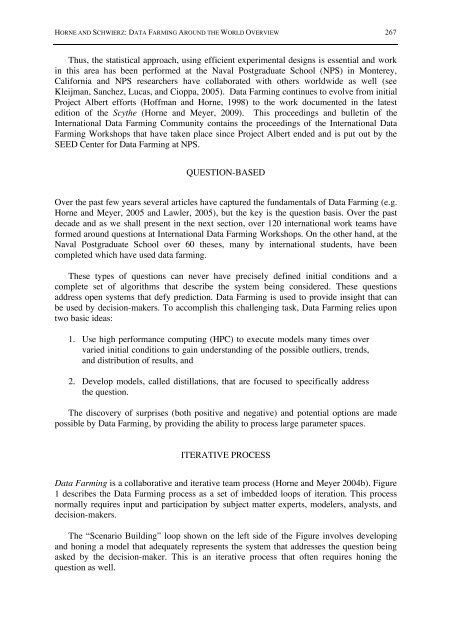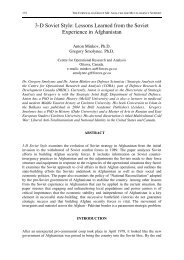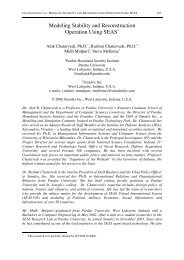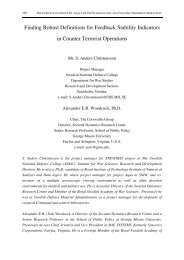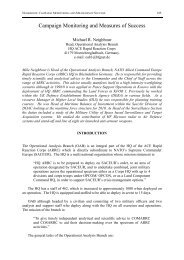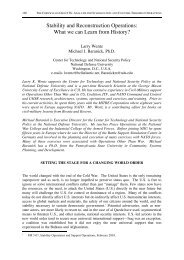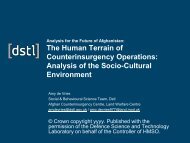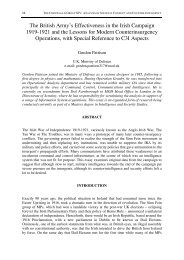Data Farming Around the World Overview - Cornwallis Group
Data Farming Around the World Overview - Cornwallis Group
Data Farming Around the World Overview - Cornwallis Group
- No tags were found...
Create successful ePaper yourself
Turn your PDF publications into a flip-book with our unique Google optimized e-Paper software.
HORNE AND SCHWIERZ: DATA FARMING AROUND THE WORLD OVERVIEW 267Thus, <strong>the</strong> statistical approach, using efficient experimental designs is essential and workin this area has been performed at <strong>the</strong> Naval Postgraduate School (NPS) in Monterey,California and NPS researchers have collaborated with o<strong>the</strong>rs worldwide as well (seeKleijman, Sanchez, Lucas, and Cioppa, 2005). <strong>Data</strong> <strong>Farming</strong> continues to evolve from initialProject Albert efforts (Hoffman and Horne, 1998) to <strong>the</strong> work documented in <strong>the</strong> latestedition of <strong>the</strong> Scy<strong>the</strong> (Horne and Meyer, 2009). This proceedings and bulletin of <strong>the</strong>International <strong>Data</strong> <strong>Farming</strong> Community contains <strong>the</strong> proceedings of <strong>the</strong> International <strong>Data</strong><strong>Farming</strong> Workshops that have taken place since Project Albert ended and is put out by <strong>the</strong>SEED Center for <strong>Data</strong> <strong>Farming</strong> at NPS.QUESTION-BASEDOver <strong>the</strong> past few years several articles have captured <strong>the</strong> fundamentals of <strong>Data</strong> <strong>Farming</strong> (e.g.Horne and Meyer, 2005 and Lawler, 2005), but <strong>the</strong> key is <strong>the</strong> question basis. Over <strong>the</strong> pastdecade and as we shall present in <strong>the</strong> next section, over 120 international work teams haveformed around questions at International <strong>Data</strong> <strong>Farming</strong> Workshops. On <strong>the</strong> o<strong>the</strong>r hand, at <strong>the</strong>Naval Postgraduate School over 60 <strong>the</strong>ses, many by international students, have beencompleted which have used data farming.These types of questions can never have precisely defined initial conditions and acomplete set of algorithms that describe <strong>the</strong> system being considered. These questionsaddress open systems that defy prediction. <strong>Data</strong> <strong>Farming</strong> is used to provide insight that canbe used by decision-makers. To accomplish this challenging task, <strong>Data</strong> <strong>Farming</strong> relies upontwo basic ideas:1. Use high performance computing (HPC) to execute models many times overvaried initial conditions to gain understanding of <strong>the</strong> possible outliers, trends,and distribution of results, and2. Develop models, called distillations, that are focused to specifically address<strong>the</strong> question.The discovery of surprises (both positive and negative) and potential options are madepossible by <strong>Data</strong> <strong>Farming</strong>, by providing <strong>the</strong> ability to process large parameter spaces.ITERATIVE PROCESS<strong>Data</strong> <strong>Farming</strong> is a collaborative and iterative team process (Horne and Meyer 2004b). Figure1 describes <strong>the</strong> <strong>Data</strong> <strong>Farming</strong> process as a set of imbedded loops of iteration. This processnormally requires input and participation by subject matter experts, modelers, analysts, anddecision-makers.The “Scenario Building” loop shown on <strong>the</strong> left side of <strong>the</strong> Figure involves developingand honing a model that adequately represents <strong>the</strong> system that addresses <strong>the</strong> question beingasked by <strong>the</strong> decision-maker. This is an iterative process that often requires honing <strong>the</strong>question as well.


